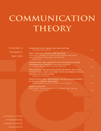
COMMUNICATION THEORY
Scope & Guideline
Pioneering Research at the Intersection of Language and Society
Introduction
Aims and Scopes
- Interdisciplinary Communication Studies:
The journal covers a broad range of communication-related topics, integrating insights from various disciplines including sociology, psychology, political science, and media studies, fostering a comprehensive understanding of communication phenomena. - Theoretical Innovations:
Communication Theory emphasizes the development and critique of theoretical frameworks that explain communication processes, such as media effects, public sphere theory, and the role of technology in shaping communication. - Empirical Research:
The journal publishes empirical studies that investigate communication practices and their social implications, utilizing qualitative and quantitative methodologies to provide evidence-based insights. - Cultural and Global Perspectives:
There is a strong focus on cultural diversity and global perspectives in communication, exploring how different cultural contexts influence communication practices and media consumption. - Critical and Reflexive Approaches:
The journal encourages critical reflections on communication theories and practices, addressing issues of power, ethics, and social justice in communication.
Trending and Emerging
- Digital Communication and Technology:
A growing emphasis on digital communication, including the implications of social media, artificial intelligence, and digital propaganda, reflects the increasing relevance of technology in shaping communication practices. - Critical Communication and Social Justice:
There is a notable trend towards exploring critical perspectives on communication, particularly concerning issues of identity, race, and social justice, highlighting the role of communication in addressing societal inequalities. - Public Sphere and Civic Engagement:
Recent studies focus on the evolution of the public sphere in the digital age, examining how communication shapes civic engagement, public discourse, and political participation. - Disinformation and Misinformation:
The journal is increasingly publishing research on disinformation and misinformation, particularly how they affect public perception and communication strategies in contemporary media landscapes. - Ethics and Moral Frameworks in Communication:
Emerging themes include discussions on ethics in communication practice, exploring moral frameworks that guide communication in various contexts, including journalism and public relations.
Declining or Waning
- Traditional Media Effects Theories:
The journal has seen a decrease in publications centered around traditional media effects theories, as scholars shift their focus to more nuanced understandings of media influence in the context of digital and social media. - Static Models of Communication:
There is a noticeable decline in the use of static or linear models of communication, as the field increasingly embraces dynamic and contextual models that better capture the complexities of contemporary communication. - Historical Communication Studies:
Research focused solely on historical perspectives of communication has waned, giving way to studies that integrate historical insights with current issues and trends in communication.
Similar Journals
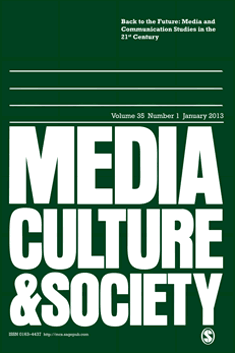
MEDIA CULTURE & SOCIETY
Exploring the Intersections of Media and Cultural DynamicsMEDIA CULTURE & SOCIETY, published by SAGE PUBLICATIONS LTD, is a prominent academic journal dedicated to the interdisciplinary exploration of media, culture, and societal dynamics. With a long-standing history since its inception in 1979 and extending to 2024, this journal serves as a vital platform for researchers, professionals, and students interested in understanding the complex interplay between media and cultural phenomena. Operating from the United Kingdom, it holds a prestigious Q1 ranking in both communication and sociology/political science categories, reflecting its significant impact within these fields. The journal’s Scopus ranks further attest to its excellence, placing it in the top percentiles and making it an essential resource for advancing scholarly discussions. While not open access, MEDIA CULTURE & SOCIETY continues to provide insightful analyses that shape contemporary discourse on the role of media in society, ensuring its relevance and importance to academic communities worldwide.

Communication Reports
Connecting researchers to the forefront of communication studies.Communication Reports is a premier academic journal dedicated to advancing the field of communication studies. Published by Routledge Journals, Taylor & Francis Ltd, this influential journal has successfully contributed to the academic discourse since its inception, with converged publication years from 1988 to 1995 and from 2005 to 2024. With an impressive impact in its categories—achieving a Q1 ranking in Communication and Linguistics, as well as a Q2 ranking in Education—it stands as a vital resource for researchers and practitioners alike. The journal consistently publishes high-quality research that tackles diverse aspects of communication, creating an intellectually stimulating platform that encourages insightful discussions and innovative ideas. Despite not being an Open Access journal, its extensive reach and reputable scholarly contributions make it an invaluable asset for anyone committed to understanding the nuances of communication in today’s complex world. The journal is based in the United Kingdom, at 2-4 Park Square, Milton Park, Abingdon OX14 4RN, Oxon, England.
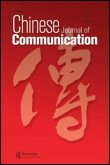
Chinese Journal of Communication
Illuminating the Dynamics of Communication in China and BeyondThe Chinese Journal of Communication, published by Routledge Journals, Taylor & Francis Ltd, has established itself as a pivotal platform for scholarly discourse in the field of communication, particularly within the context of Chinese media and its global interactions. With a notable Q1 ranking in the 2023 Communication category and a commendable Scopus ranking of #77 out of 511 journals, it represents a significant contributor to the advancement of communication studies. The journal's focus extends from theoretical frameworks to empirical research, fostering a comprehensive understanding of the evolving communication landscape. Available in both print (ISSN: 1754-4750) and digital formats (E-ISSN: 1754-4769), the journal does not operate on an Open Access basis, yet it remains a highly sought-after resource for researchers, professionals, and students aiming to explore communication phenomena from a Chinese perspective. Given its publication history converging from 2010 to 2024, it serves as a valuable reference point for ongoing academic investigations and is instrumental in shaping future research directions in this dynamic field.

Review of Communication Research
Bridging Ideas Across Communication DisciplinesReview of Communication Research is a prestigious open-access journal dedicated to advancing the field of communication studies. Published by REVIEW COMMUNICATION RESEARCH from its base in Madrid, Spain, this journal has established itself as a vital platform for scholarly discourse since its inception. With an impressive impact factor and ranked in the Q1 quartile of communication journals for 2023, it holds a commendable position, placing it within the top 13% of approximately 511 journals in the communication category on Scopus. Since becoming open-access in 2013, the journal has enabled researchers, professionals, and students to access high-quality research without financial barriers, thereby fostering a greater dissemination of knowledge and dialogue within the community. Covering a wide array of topics from communication theory to media studies, the Review of Communication Research continues to contribute significantly to the understanding and evolution of communication in today’s interconnected world. Researchers are encouraged to engage with and submit their findings to this influential journal to further enrich the scholarly landscape.
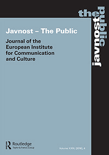
JAVNOST-THE PUBLIC
Pioneering Insights in Public CommunicationJAVNOST - THE PUBLIC is a prestigious academic journal that has established itself as a leading platform within the field of communication. Published by Routledge Journals, Taylor & Francis Ltd in the United Kingdom, this journal caters to researchers, professionals, and students interested in the multifaceted dynamics of public communication and societal engagement. With an impressive Q1 ranking in the Communication category as of 2023 and a Scopus ranking of #166/511, placing it in the 67th percentile, it is widely recognized for its rigorous research contributions and theoretical insights. The journal has been in continuous circulation since its inception in 1994, and it actively seeks to publish high-quality, empirical studies that explore the nuances of public discourse, media influence, and societal interactions. Though a traditional publication, JAVNOST - THE PUBLIC remains committed to advancing the field by offering valuable resources and knowledge crucial for addressing contemporary challenges in public communication.
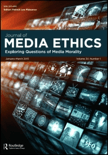
Journal of Media Ethics
Championing Ethical Standards in Communication.Journal of Media Ethics, published by Routledge Journals, Taylor & Francis Ltd, is a pivotal platform for scholars and practitioners interested in the intersection of media, ethics, and communication. Operating since 2015, this esteemed journal has consistently contributed to the discourse on ethical frameworks in contemporary media practices, making significant strides in the fields of communication and philosophy. With an impressive Q2 category ranking in Communication and a Q1 category ranking in Philosophy as of 2023, the journal demonstrates its influence and relevance, achieving Scopus ranks that place it in the top 87th percentile for Philosophy and the 62nd percentile for Communication. Despite being a subscription-based journal, it caters to an interdisciplinary audience eager to explore the ethical dimensions of media in a rapidly evolving digital landscape. Researchers, professionals, and students alike will find valuable insights and innovative research within its pages, underscoring the importance of ethical considerations in framing media narratives.

Communitas
Bridging Disciplines, Expanding PerspectivesCommunitas, published by the University of the Free State, is an esteemed open-access journal that has been a gateway for innovative research and discourse in the fields of communication, linguistics, and language since its inception in 2017. With an ISSN of 1023-0556 and E-ISSN of 2415-0525, the journal aims to foster scholarly exchange by providing a platform for critical analysis and interdisciplinary collaboration. Although it currently falls into Q4 in Communication and Q3 in Linguistics and Language, *Communitas* has made significant strides in establishing its presence in Scopus rankings—ranking 567 out of 1088 in Arts and Humanities and 397 out of 511 in Communication—and sources for researchers at varying stages of their careers. Addressed to a global readership, the journal invites contributions that enhance understanding and generate new perspectives on socio-linguistic issues and communicative practices, making it a pivotal resource for researchers, academics, and students committed to advancing knowledge in these dynamic fields.

CIC-Cuadernos de Informacion y Comunicacion
Empowering Research with Open Access to New IdeasCIC-Cuadernos de Informacion y Comunicacion is a leading academic journal published by the Universidad Complutense de Madrid, serving as a vital resource for scholars and practitioners in the fields of information and communication studies. Launched in 1995 as an Open Access journal, it provides an invaluable platform for disseminating innovative research and critical analysis related to communication theory, media studies, and information technology. With its focus on fostering interdisciplinary dialogue, CIC encourages submissions that explore contemporary challenges and advancements in the information landscape. Although the H-index and Scopus rankings are currently not specified, the journal’s commitment to excellence and accessibility positions it as an important contributor to academic discourse. The journal is based in Madrid, Spain, and aims to reach a global audience of researchers, professionals, and students dedicated to furthering knowledge in the rapidly evolving domains of communication and information sciences.
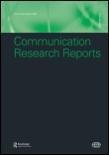
Communication Research Reports
Uncovering Innovations in Communication ResearchCommunication Research Reports, published by Taylor & Francis Ltd, is an esteemed academic journal in the field of communication studies, known for its rigor and scholarly contribution since its inception in 1988. With an impressive Q1 ranking in the Communication category as of 2023, it stands out as a pivotal resource for researchers, professionals, and students alike. This journal focuses on disseminating high-quality empirical research and theoretical discussions that advance understanding in communication practices and dynamics. Although it does not operate under an Open Access model, its consistent publication continues to engage a global audience and supports the ongoing dialogue within the discipline. With its commitment to enhancing scholarly communication, Communication Research Reports is vital for those looking to stay abreast of cutting-edge developments in the social sciences, specifically within communication.

Comunicacion y Sociedad-Guadalajara
Connecting ideas, shaping societies through research.Comunicacion y Sociedad-Guadalajara is a distinguished peer-reviewed journal published by UNIV GUADALAJARA that plays a vital role in the field of communication studies. With an ISSN of 0188-252X and an E-ISSN of 2448-9042, this journal has embraced Open Access since 2023, ensuring that groundbreaking research is accessible to a wider audience. Hailing from Mexico, it serves as a platform for innovative research and critical discourse in communication, ranking Q2 in the Communication category and securing a notable Scopus rank of #[232/511, positioning it within the top 54th percentile of its field. Covering converged years from 2009 to 2010 and from 2013 to 2024, the journal's objective is to foster scholarly dialogue and advance knowledge across diverse aspects of communication. With a commitment to excellence, Comunicacion y Sociedad-Guadalajara stands as an essential resource for researchers, professionals, and students seeking to engage with contemporary issues in communication.